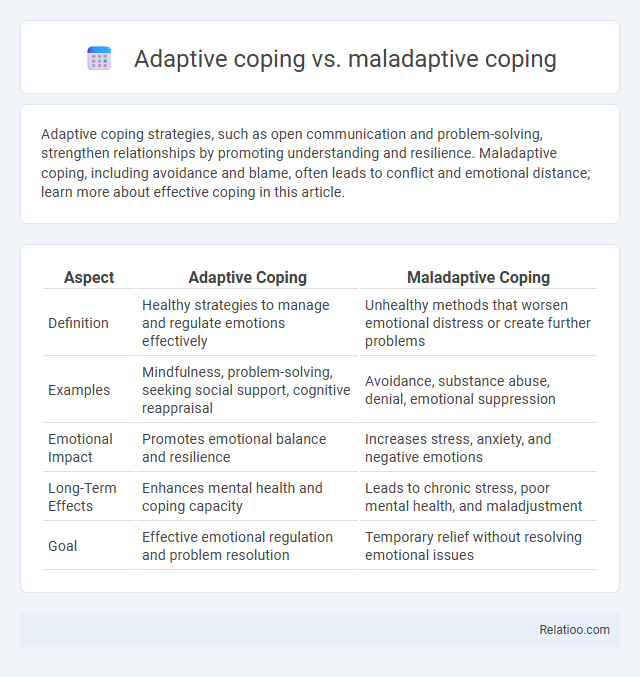Adaptive coping strategies, such as open communication and problem-solving, strengthen relationships by promoting understanding and resilience. Maladaptive coping, including avoidance and blame, often leads to conflict and emotional distance; learn more about effective coping in this article.
Table of Comparison
| Aspect | Adaptive Coping | Maladaptive Coping |
|---|---|---|
| Definition | Healthy strategies to manage and regulate emotions effectively | Unhealthy methods that worsen emotional distress or create further problems |
| Examples | Mindfulness, problem-solving, seeking social support, cognitive reappraisal | Avoidance, substance abuse, denial, emotional suppression |
| Emotional Impact | Promotes emotional balance and resilience | Increases stress, anxiety, and negative emotions |
| Long-Term Effects | Enhances mental health and coping capacity | Leads to chronic stress, poor mental health, and maladjustment |
| Goal | Effective emotional regulation and problem resolution | Temporary relief without resolving emotional issues |
Understanding Coping Mechanisms
Adaptive coping involves positive strategies like problem-solving and seeking support that effectively reduce stress and promote mental well-being. Maladaptive coping includes harmful behaviors such as avoidance or substance abuse that may temporarily relieve stress but worsen overall health. Understanding your coping skills helps you identify and develop healthier methods to manage challenges and improve emotional resilience.
Defining Adaptive Coping Strategies
Adaptive coping strategies involve healthy techniques that help you manage stress and emotions effectively, such as problem-solving, seeking social support, and practicing mindfulness. These strategies enhance resilience and promote long-term psychological well-being by addressing challenges constructively. In contrast, maladaptive coping often includes avoidance, denial, or substance abuse, which may provide temporary relief but ultimately worsen stress and emotional health.
What Is Maladaptive Coping?
Maladaptive coping refers to strategies that temporarily reduce stress but ultimately worsen emotional or physical health, such as substance abuse, avoidance, or denial. These behaviors hinder effective problem-solving and often lead to increased anxiety, depression, or other negative outcomes. In contrast, adaptive coping involves constructive methods like seeking support, problem-solving, and emotional regulation, while coping skills encompass both adaptive and maladaptive techniques individuals use to manage stress.
Key Differences Between Adaptive and Maladaptive Coping
Adaptive coping involves strategies that effectively reduce stress and improve emotional well-being, such as problem-solving, seeking social support, and positive reframing. Maladaptive coping, in contrast, includes behaviors like avoidance, substance abuse, and denial, which may provide temporary relief but ultimately exacerbate stress and hinder personal growth. Coping skills refer to the learned techniques individuals use to manage stress, with adaptive skills promoting resilience and long-term mental health, while maladaptive skills often lead to negative psychological outcomes.
Psychological Benefits of Adaptive Coping
Adaptive coping strategies promote psychological resilience by helping you effectively manage stress and emotional challenges, enhancing overall mental well-being. These skills facilitate problem-solving and positive emotional regulation, reducing anxiety and depressive symptoms. Maladaptive coping, in contrast, often exacerbates psychological distress and impairs long-term mental health.
Common Examples of Maladaptive Coping
Common examples of maladaptive coping include substance abuse, avoidance, and self-harm, which often worsen stress and hinder emotional growth. Adaptive coping strategies like problem-solving, seeking social support, and mindfulness promote resilience and healthy emotional regulation. Developing effective coping skills enables you to manage challenges constructively and improve overall mental well-being.
Factors Influencing Coping Styles
Factors influencing coping styles include personality traits, social support networks, and past experiences, which shape whether adaptive or maladaptive strategies are employed. Adaptive coping skills promote effective stress management and psychological resilience, while maladaptive coping often leads to increased emotional distress and health problems. Understanding these factors helps you develop healthier coping skills tailored to your individual needs and circumstances.
Consequences of Maladaptive Coping
Maladaptive coping strategies, such as avoidance or substance abuse, can exacerbate stress and lead to long-term psychological issues like anxiety, depression, and decreased resilience. Unlike adaptive coping skills that promote problem-solving and emotional regulation, maladaptive behaviors hinder your ability to manage challenges effectively. Recognizing and replacing maladaptive patterns with healthy coping skills is essential to improve mental health outcomes and overall well-being.
How to Promote Adaptive Coping Skills
Promoting adaptive coping skills involves building emotional resilience through techniques such as mindfulness, problem-solving, and seeking social support, which help individuals manage stress healthily. Encouraging consistent practice of these positive coping strategies reduces reliance on maladaptive coping mechanisms like avoidance, substance abuse, or denial that exacerbate psychological distress. Mental health professionals advocate for psychoeducation and skill-building interventions to empower individuals to develop adaptive coping patterns that enhance overall well-being and stress management.
Supporting Healthy Coping in Daily Life
Adaptive coping involves effective strategies like problem-solving and seeking social support that promote emotional resilience and stress management. Maladaptive coping includes behaviors such as avoidance or substance abuse, which may provide short-term relief but ultimately harm your mental health. Developing strong coping skills enables you to navigate daily challenges healthily, fostering long-term well-being and emotional balance.

Infographic: Adaptive Coping vs Maladaptive Coping
 relatioo.com
relatioo.com